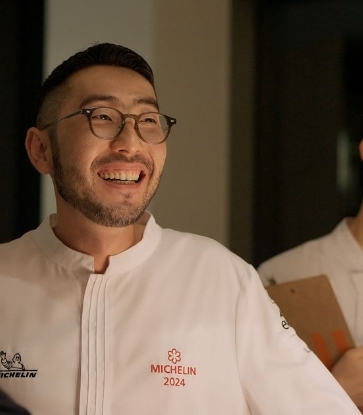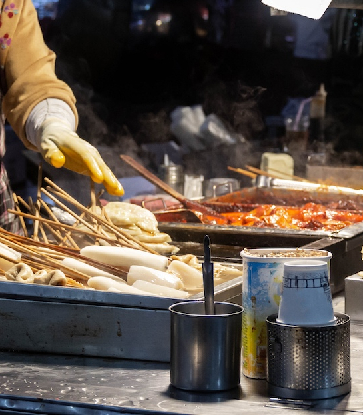Those who have dined at Onjium often say that a meal in the lauded MICHELIN-starred restaurant can easily make you feel like you’re the only person in this world.
All it takes is a spoonful of rice, lovingly prepared by the head chef Cho Eun-hee, for a diner to feel the sincerity and warmth in her cooking.
What drives Cho — who has been trained in Korean royal court cuisine— to create the delicate and exquisite Korean cuisine that she has come to be celebrated for? How does she deliver her brand of warm-hearted leadership? We speak to Cho in a one-on-one interview to find out more.
What motivates you to get out of bed everyday?
My week goes by very quickly. I get up at 5 am everyday and then head to the restaurant. It’s the midnight when I come back home. The restaurant is now running at full speed, and for me, a day off is so precious. On my days off, I make sure to rest and take care of my health. I listen to music and let myself enjoy a deep sleep. On Mondays, I set aside time for preparation, such as studying or visiting popular restaurants with colleagues. These days, restaurant customers have high standards. We must be aware of what customers think. In addition, I get motivation from other renowned chefs.

You were trained in the royal cuisine of the Joseon Dynasty, which has been designated as one of Korea’s national intangible cultural assets. How do you interpret this food tradition for your modern diners at Onjium today?
I feel I am energized by the delicate and exquisite nature of Korean royal court cuisine, and local dishes that can convey the energy from the nature. Even though time has passed, the nobility of the cuisine from that time remains. I believe that my mission is to revive the tradition of our ancestors and to pass it on to our descendants, and to connect the dots from the past to the future.
I have many teachers, seniors, colleagues, and juniors around me. At Onjium, we treat Korean royal court cuisine as more than just the food consumed by noble families of the past. Korean royal court cuisine is, indeed, a cultural heritage that has upheld the tradition of cooking using the best ingredients from all eight provinces of Korea. In this regard, it is the essence of local food of Korea.
Together, the cuisines of the royal court and noble families, local food, and Korean Buddhist temple cuisine, form a unique and united eating culture in Korea — you cannot remove any single element from this composition. The cuisine of the past is never boring. The trace of tradition embedded in the passage of time is even more impressive. Of course, it does not mean that at Onjium, I just reproduce the food from the past. I try to remember the feeling of it and to interpret the cuisine in a modern way.
We conduct liberal arts classes at Onjium twice a month to study Korean history and culture together. One concept we have studied is that of “Thinking Hands,” which encourages participants to do some soul-searching about people and their relationships in society, prior to handle knives or fire with their hands.
How important is teamwork to you? How do you build and grow your team?
Sometimes, I get exhausted or overwhelmed by a fear from cooking. However, I feel encouraged when I think of my colleagues. A journey is more enjoyable when there are other people who look in the same direction. For instance, my fellow Onjium chef, Park Seongbae, is a close ally I turn to. We are on the same wavelength. We had pursued different careers before meeting at Onjium. I had been in the education field for a long time, while Chef Park’s career has been more hands-on. At Onjium, I am responsible for the emotional elements and little details, while Park plays a more active and operational role. We have a synchrony and a common direction.
Grooming junior chefs has not been easy, to be honest. Given that Onjium is a place where we all gathered to nurture more talent in this industry, I promise myself to become a little more generous. An unhappy chef can never cook delicious dish. When I hire staff members, I focus on the candidate’s attitude and personality. One who wants to cook healthy and aesthetic cuisine should never smoke or drink. I always recommend them not to take beverages or junk food with strong flavors, at least when they cooking. These types of food and drinks can ruin the palate of a cook. When all the team members of Onjium work in harmony, cooking is an exciting journey, both for us as well as our patrons.
When and how did you discover your love for cooking?
At the age of 27, I began studying Korean food culture at the Institute of Korean Royal Cuisine. I had to start from the basics and naturally developed an interest in royal court cuisine. Cooking and eating made me feel healthier, and I was impressed by how stylish and beautiful the cuisine was. I have spent half of my life learning about, teaching, and cooking Korean food, but the incredible qualities of Korean food still makes my heart beat, even today.
My mother has been a great influence and anchor in my life. Even though family was in a tight financial situation when I was growing up, my mother would cook meals that I still remember vividly today. She made her own Korean soy sauce and kimchi. Sometimes, she would make her special Cannellini Kisses filled with sweetened white bean paste made from geopipat, or de-hulled red bean. Whenever she bought good quality eggs, she would baked Castella cakes for me. I always enjoyed going grocery shopping with her. She never hurried when shopping. She would took a look around the market and purchase the most fresh and quality ingredients at the most reasonable prices. Her dishes gave me a feeling of happiness and security.

What is the most important thing, for you, when it comes to creating a dish?
I don’t Korean food at Onjium to make money. My mission is to discover the value of Korean food and educate young chefs to make them want to carry on this cultural tradition. The essence of this is in mastering the traditional fermented pastes. It does not make any sense to preserve the tradition of Korean food, when one cannot make doenjang (soybean paste), gochujang (red pepper paste), and ganjang (soybean sauce). The taste of fermented paste marks the starting point of all Korean cuisine. So, we ferment and age all our pastes ourselves.
Due to the space constraints in Seoul, we established a paste-fermenting site in Joan-ri, Namyangju city. In particular, it is very pleasant to study the fermentation process of kimchi, as there are various ingredients for kimchi and its taste can vary widely. The ingredients and the season, rather than a person’s recipe, determines the elegant taste and flavor of kimchi.
Ingredients determine the success of failure of a dish. I have met good suppliers in Gyeongdong and Noryangjin conventional grocery markets and I will always try to buy directly from the producers if possible. I also order my ingredients online or by phone. We are now living in such a privileged time when we can utilize both on-line and off-line channels to get good ingredients.
What are some of your favorite aspects of Korean cuisine?
Another virtue of Korean cuisine is that it can be served in several courses or in one-dish meal. I consider “jeong,” or the mindset of sharing, a very important element of Korean food. Even though a dish may be very delicious, it cannot be beautiful when it is served in only small portions.
Therefore, even in the tasting menus I create, I always include one to two dishes for sharing. There are dishes that look beautiful when they are loaded high on plate. For example, japchae (a mixed dish of boiled bean threads, stir-fried vegetables, and shredded meat), looks very enticing it is served in generous portions and garnished with chopped pine nuts and julienned pears on top. I enjoy some variations, but not too much.
It does not mean that I stick to conventional things. I try to revive Korean food in an even more elegant way. I think we need to further discover the value of Korean food. Although the cuisine is ours, there are many things about it we can still discover. Onjium is designed for this exactly: to create a beautiful harmony of the values of the past and present.

What are your thoughts on the future of Korean cuisine? And your own future?
Hansik, or Korean food, has a calm and natural energy arising from the mild tastes from fermentation. Thanks to the global trend of seeking out for healthy food, I expect that Korean food will receive more and more attention.
A big part of the identity of Korean food is that it should be nourishing for those who consume it. When the foundation of this restaurant is more sound, I would like to establish other channels, which will be a bit more popular, for iconic Korean food, such as gomtang (beef-bone soup), jinju bibimbap, baekhwaban (rice with seasoned vegetables). At the same time, I will put in my best efforts to promote Korean food to the world.
I would like to showcase the elegant and flavorful nature of Korean food at the global table. The profound tastes of our seasonal herbs, agricultural and marine products obtained from nature, and our culture of fermentation are invaluable.
Looking back in my 50s, I realize that I made a good choice to enter the world of cooking. My mother’s food, the cooking basics that my teachers taught me, and the attitudes I developed from learning from masters of Korean food across the country, are the content that fills the pages and chapters of my life. Through food, we can taste one’s life. This is what touches me. I still have lots and lots to learn.
In the old recipe books and documents from the past, we can find infinite recipes that are easy to forget about, although we are well aware of them, and even they have not yet been fully understood. In addition, the seniors, who are older than 80, are actually our guides through life. When I first started on this career, I simply thought that it is interesting to learn about food and I want to excel. However, I realized that it will be deplorable if the beginning point, established by our ancestors, and the path, which they left, are disconnected because of me. I need to do my best to succeed and at the same time, become a link for the future generation to this glorious past.

This post is brought to you in partnership with Genesis

Genesis is a design-focused luxury brand that embodies the philosophy of Athletic Elegance. The Genesis product lineup consists of the flagship SUV GV80, flagship G90 luxury sedan, the G80 and G80 Sport midsize luxury sedans, and the G70 luxury sport sedan, which was named 2019 North American Car of the Year. In 2018, Genesis was the highest-ranked brand in the automotive industry awards for quality and owner satisfaction by respected, third-party experts, including Consumer Reports, J.D. Power and AutoPacific.
For more information on Genesis and its new definition of luxury, please visit http://www.genesis.com
main photo by lamainedition



















